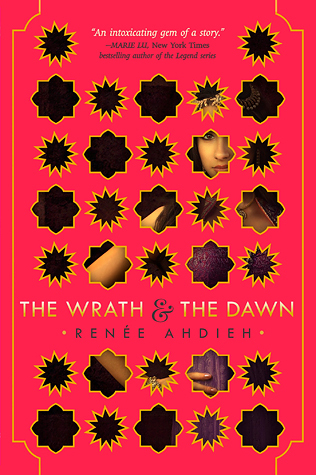TL;DR revenge doesn't get you anywhere good
TBR #1265
finished 3/12/15
Man, this book was beautiful. I don't think I can really do it justice in my own words.
I feel like I should first mention that I am completely unfamiliar with A Thousand and One Nights. I can't tell you whether The Wrath and the Dawn is a true retelling, or if it's like Winterspell where it's inspired by the story but takes the ideas and goes its own direction.
With that said, I really like how the ideas were used. I did some basic research while I was reading and I liked the different direction The Wrath and the Dawn took compared to what I read of A Thousand and One Nights. The narration style made it feel very unique and even almost fairy tale-like, which probably has something to do with my unfamiliarity with the setting and its culture.
As a geography nerd I'm surprised by the lack of attention I paid to the map at the beginning OTL. Despina says she's from Thebes, which I recognized as a city in Greece, but I didn't recognize that Khorasan and Parthia were real regions. Part of this can be blamed on my public school education that focused on Greek and Roman civilization a hell of a lot more than Western Asia. I also don't have much experience looking at older-style maps, so I have to admit the one in the book threw me off -- it took me at least a minute to recognize the coastlines.
I liked the care and detail that was put into describing the setting and the culture of The Wrath and the Dawn. The narration definitely painted a clear visual picture. Most of what I noticed was about the architecture or the clothing, and I don't know if this is just my attention span being selective. I still feel like I don't know much about the human geography of Khorasan, but I think that's also to be expected when most of the story takes place within the palace.
All of the characters were very faceted and there was obvious development by the last chapter. Most (if not all) of the characters fell into a morally gray area and I loved how the omniscient narration showed both sides of what was going on. It definitely made it hard to decide what I personally wanted to happen over the course of the story, because being attached to both sides of the conflict means you're gonna get hurt no matter what happens.
My biggest complaint is the lack of time-related cues in the narration. Some events that happened in back-to-back chapters were mentioned to be weeks apart in the dialogue, but there was no indication of that in the chapter transitions. A lot of inconsequential, mundane stuff isn't shown in order to keep the story stronger, but I don't think it was compensated for enough in the narration. This also made some of Shahrzad's growth feel too convenient and almost Stockholm-like.
(I really don't know where I stand in regards to the romance, so I'm just gonna skip it for right now.)
I also think it took a little too long for Khalid to finally explain his reasoning; there weren't enough hints up until the point that he finally told Shahrzad. I can understand the point of keeping the audience in the same kind of dark Shahrzad was in, but by the point he tells her, it seems like it's way too late for him to change the damage Shahrzad has caused and I don't know how that's going to be handled in The Rose and the Dagger.
On a related note, I think the magic aspect could have been explored a little further. There isn't enough about the magic that's driving most of the story, so I have no idea what kind of repercussions are possible. I like the system of magic and the implications of it and I'm hoping that the second book will cover it a lot more.
TL;DR it was really captivating, and it's a great We Need Diverse Books novel with a wonderful cast of characters. The book also ended with a cliffhanger, so I'm going to be watching the library for the addition of the next in the series.


No comments:
Post a Comment